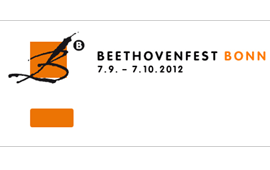> [Archived] Chronicles

The Games between Old and New (or the last days of the Beethoven Festival)
The small German town of Bonn became the music capital of the world between 7th September - 7th October, as Ludwig van Beethoven (the composer born here 242 years ago) was celebrated with grandeur.
The London Philharmonic Orchestra, conducted by Esa Pekka Salonen, performed the integralset of Beethoven's Symphonies, turning the concert into an event of Olympic proportions.
The nine symphonies were also accompanied by contemporary compositions from all five continents; just as the five olympic interlocking rings symbolise the unity between continents in the world of sports, the series of concerts represents the universality of musical language transgressing different cultures of the world.
This concert series was therefore called the Beethoven Olympic.
The Programme
The series of concerts held at the Beethovenhalle, opened Wednesday night with Symphony No.1in C major, and Symphony No. 7 in A Major.
The composition placed between the two symphonies was Concerto forViolin and Orchestraofthe South KoreancomposerUnsukChin, performed by Viviane Hagner who also played the world premiere of this concert in 2002. The creation of the Korean composer (who has been living in Berlin since 1988 and took composition lessons with Ligeti) offers a lot of freedom for the soloist, who can freely improvise and display all of his/her technical assets. Viviane Hagner loves this concerto, and this was clearly reflected in her intense and enjoyable performance.
On Thursday night, we listened to Symphony No. 2 in D Major and Symphony No. 3 in E flat major, also known as the Eroica, along with the piece called Testamentby the Australian composer Brett Dean.
Let's not forget that Brett Dean is not so unfamiliar with German culture, as he has been a violinist in the Berlin Philharmonic Orchestra for 14 years.
His opus called Testament is related to The Testament of Heiligenstadt, the letter Beethoven wrote in 1802, in the Viena suburb of Heiligenstad.
Brett Dean composed this piece for the Berlin viola ensemble and adapted it for chamber orchestra in 2002.
Joseph Phibbs, the London born composer, represented Europe on the night of 5th October at the Beethoven festival.
His composition, Rivers to the Sea, is dedicated to the city of New York and is a rendition of how the night turns into day in the city that never sleeps. Symphony No. 6 in F major, also known as the Pastoral Symphony, and Symphony No. 4 in B-flat major, were also performed on the same night.
Back to Joseph Phibbs, what needs to be mentioned is that the orchestral virtuosity from Rivers to the Sea connects him to his teacher, the American Steven Stucky - a composer much more well known in the United States than in Europe.
There are similarities between Steven Stucky `s Radical Light - presented on 6th October - and Phibbs' opus: the titles inspired from poems belonging to American authors (Rivers to the Sea by Sara Teasdale and Radical Light by Archie Randolph Ammons) and the nocturnal atmosphere.
The final concert was held on 6thOctober and it opened with Ghanaia II, a symphonic oeuvre for percussion composed by Matthias Schmittwhich represented the African continent.
The performance belonged to the Austrian percussionist Martin Grubinger & Friends.
The last piece presented in the festival was Symphony No. 9, performed by the Philharmonia Orchestra, and the four soloists: Giselle Allen (soprano ), Anne-Marie Owens (mezzo-soprano), Andrew Kennedy (tenor), James Rutherford (bass), and the choirs of WDR (Koln) and NDR (Hamburg).
The Performance
I was impressed by the extraordinary accuracy and the harmonious, smooth sound of the wonderful Philharmonia Orchestra from London, conducted by Esa Pekka Salonen, who is also the Artistic Advisor of this orchestra.
The concerts were electrifying, perfect for the cover of a CD, if I may say so.
The Finnish orchestra conductor has a very anticipative style, he is very consistent and extremely methodical (although he may be somewhat rigid at times). Sobriety and balance were the central ideas in shaping the Beethovenian symphonies.
This was Salonen's second experience with Beethoven's symphonies, his first one was a collaboration with the Los Angeles Philharmonic.
Beethoven's Music vs 20th Century Music
The concerts were very successful as the audience appreciated not only the quality of the performance, but also the distinction of the Beethovenian compositions on the one hand, and the contemporary pieces on the other hand.
Interviewed by Markus Schwering, Esa Pekka Salonen commended on his decision of joining new music and Beethoven's symphonies together:My greatest fear is that we are constantly growing further apart from Beethoven, and the connection with him is getting ever fragile. This tie might break at some point. I do not want to go through this, which is why I will take measures by adding new pieces. If great creations of the past are not connected to those of present, our entire culture might become meaningless.
A big thank you to the organisers of the Beethoven Festival for their support and kindness.
Translated by Câșleanu Gianina-Aniela
MTTLC,Bucharest University














